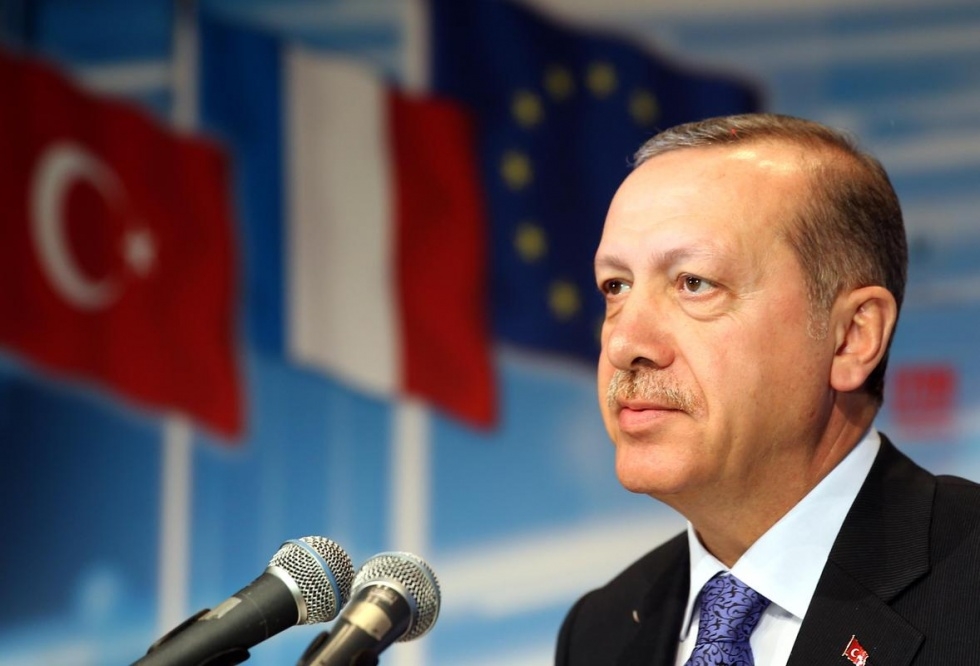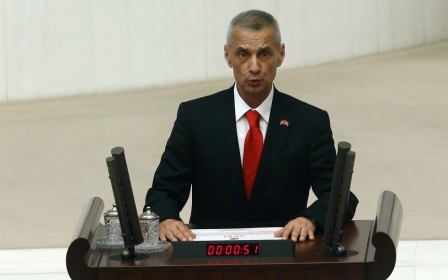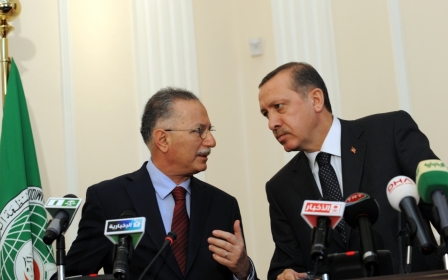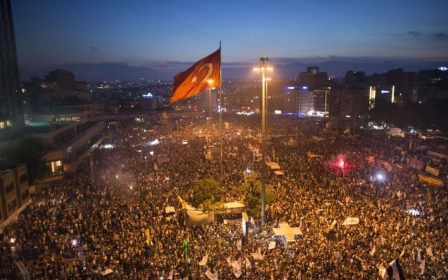'Sledgehammer' hangs over Turkey’s presidential race

When Turkey's Constitutional Court last week decided to release 230 former military officers convicted in the infamous ‘Sledgehammer’ coup plot case – saying that the lower court had in 2012 “violated their right to a fair trial” – many were taken by surprise.
With Prime Minister Recep Tayyip Erdogan widely expected to announce a presidential bid in the next few days, critics say the decision reflects the premier’s need to shore up alliances amid an intensifying conflict with Fethullah Gülen's Hizmet movement.
"On the one hand he [Erdogan] is trying to win allies by releasing the ex-military personnel; on the other he is blaming Hizmet and trying to acquit itself as if they were not allies once," said Ahmet Sik, a Turkish journalist who spent a year in the prison writing the banned book Imam's Army on the secretive Hizmet movement that is believed to exert influence in the country’s highest corridors of power.
Suspicions that the prime minister is taking an unprecedented step towards the military – traditionally his administration’s arch-rivals - were raised when Erdogan indirectly welcomed the court’s decision. His ruling party, the Justice and Development party (AKP) is historically seen as strongly supportive of Sledgehammer and other trials that implement the army in coup plots.
"When I talked about the possibility of a [Sledgehammer] re-trial, some downplayed it. This verdict paves the way for re-trials," said Erdogan. He added that the decision “creates an opportunity” for the 230 officers convicted in the plot, and that he hoped “justice will triumph in the end”.
The AKP has to announce its candidate in August presidential election by July 1. The opposition has already put forward the influential Ekmeleddin İhsanoğlu, a former Secretary-General of the Organization of Islamic Cooperation.
Eyes on the prize
Oral Calislar, a columnist at the Radikal newspaper, agrees that the Constitutional Court's decision to an extent must have been shaped by a change in the government's stance. "But this does not necessarily mean that [this change] will have an effect on the outcome of presidential elections."
A total of 326 officers, including the top commanders Cetin Dogan, Ozden Ornek and İbrahim Firtina, were convicted en masse in the September 2012 Sledgehammer case, with all handed sentences of between 15 and 20 years. An appeals court released 88 defendants over lack of evidence in October 2013.
The army stood accused of a plot to provoke widespread chaos in the country through bombing mosques and some non-Muslim properties in Turkey, as well as provoking Greece to trigger a war. Although allegedly hatched by top army generals at a military seminar, defendants had argued that the plot was a theoretical scenario to help them plan for potential unrest.
At the time, the Sledgehammer trial was quickly linked to the "Ergenekon" case, an alleged clandestine organization that purportedly operated with the aim of eventually toppling the AK Party government.
Erdogan had in 2008 declared himself the “nation’s prosecutor” against coup plots such as Ergenekon, a pronouncement that came as the AKP was facing a legal challenge with the country’s highest court considering if it should be banned for alleged anti-secular activities.
Since reports of the alleged plot first surfaced in the Taraf newspaper in 2010, Sledgehammer has become a nexus for many Turkish political controversies. For instance, defendants claimed that the "evidence" presented to the court was fabricated by "shadowy figures" within the judiciary.
Referring to that he calls a "purge" to remove the military from politics, Sik says a “new tutelage” has emerged in the hands of the AKP and Hizmet since 2005, under the pretext of Ergenekon.
Sik says the Ergenekon case, Sledgehammer, and other cases such as a football match-fixing scandal are all linked to plans to “purge elements of the existing tutelage and replace it with another under the Hizmet and AKP alliance”.
Calislar agrees that the justice system has been manipulated.
"I always said that justice has not been served properly in the cases like Sledgehammer and Ergenekon," he told MEE. "Everything has been thrown in the same bag, and innocent people have been convicted together with potential criminals."
Government circles have always insisted that the Sledgehammer plot represented yet another attempt by the military elite of the Turkish Republic to re-position itself as the "guardian" of the secular and Kemalist nature of the state.
The army directly interrupted the democratic process three times through in Turkey last century with coups in 1960, 1971 and 1980.
An “indirect” 1997 coup – in which the government was forced out but without a dissolution of parliament or suspension of the constitution – also saw the first Islamist-leaning government of Turkey, the Welfare Party, made to resign.
During this putsch to remove "Islamist" elements from the government as well as from military circles, Erdogan as the then mayor of Istanbul was jailed for calling for the destruction of the country’s secular structure.
As is argued here, here and here, it was the impact of this 1997 coup - combined with the political and economic instability of the 1990s - that led the reformist camp in the Islamist bloc to form the AKP. The party went on to secure a landslide election win in 2002, and with the help of the Gülen movement, it penetrated the very fabric of many bureaucratic institutions.
For years, the momentum of the anti-coup trials boosted Erdogan’s political position.
When the top commanders of four forces (army, navy, air force and gendarmerie) resigned en masse in response to to the detention of 250 officers over Sledgehammer, critics said it represented the end of the first republic established in 1923 by president Mustafa Kemal (Atatürk) and the beginning of “a second republic” led by the AKP.
Shifting tides
However, the tide began to change last year when a decade-old alliance between Erdogan’s AKP and Gülen's Hizmet movement began to falter.
A government decision to close down all private preparatory schools in November 2013 was considered a direct attempt to cut some of the financial veins of the Hizmet movement. The Gülen movement is estimated to own at least 20 per cent of the study centres in Turkey.
According to Etyen Mahcupyan at Aksam newspaper, this fracture has led to a less clear position - even within the government – towards the coup trials.
"In the past few years, the government took a more neutral stance regarding the high-profile trials like Sledgehammer and Ergenekon" Mahcupyan told MEE.
Although it surfaced just last year, the tense relationship between the AKP and the Hizmet movement dates back when the prosecutors called the Chief of National Intelligence Organization (MIT) Hakan Fidan for testimony on his dealings with the outlawed Kurdistan Workers' Party in 2012.
There was almost a consensus among different segments of the political umbrella on that the move to summons Fidan - a long-time protege of Erdogan - was an obvious hostile move by the Hizmet movement. In this regard, the closure attempt of the schools could be considered a direct retaliation by the government.
For Sik, "the 2012 MIT crisis was the turning point. Once the two former allies found themselves in a fight, the AKP has begun to 'solve' the controversial cases one-by-one."
Conflict points
The subsequent and decisive events that followed in December 2013 were another breaking point in the current Turkish political environment. The corruption probe that targeted ministers, high level bureaucrats and businessmen could be considered the Hizmet movement's declaration of war.
And all of these scuffles ended up having repercussions on the calculations of the past. Just a few days after the corruption probe started, Erdogan's chief political advisor Yalcin Dogan said: "those who plot against their own national military, national intelligence, national bank and the civilian government that addressed to the nation for many years could not mean anything good for their own country."
Shortly after, the government declared that it would take the necessary steps to reopen the Sledgehammer and Ergenekon cases.
"Once the AK party and the Gülenists were done with the military they became enemies, “ Soli Ozel at Kadir Has University said in an interview in January. “Now the prime minister needs allies and needs to vilify the Gülen movement, so reopening those cases, with another bunch of prosecutors and judges exposing them for what they are is a case of killing two birds with one stone."
"[The government] better understood what was going on" Mahcupyan told MEE about the AKP’s apparent change of heart on the trials. "It started to distinguish criminals from innocents, and abandoned its initial stance."
Calislar linked what was happening to AKP suspicions over the judiciary. He said "This was when we understood that the police and judiciary was totally under the control of the 'parallel' structure [Hizmet movement]."
"With a full-fledged conspiracy mentality, a series of investigation and judicial plots have been fabricated in line with the 'parallel' organization's political goals" he told MEE.
Calislar thinks that the government's shift regarding the trials have become more prominent once Erdogan realised the extent of which the December corruption probe plotted against them. "Erdogan initially supported those trials, but he objected arresting everyone like Ilker Basbug [the former chief of staff]."
However, for Mahcupyan, Erdogan declaring sympathy for the convicts should not actually affect the outcome of the presidential election.
"One fact should not be underestimated. The army is not a monolithic bloc and if you look at the areas where there is a strong military personnel electorate, statistically AKP is [still] the strongest party", he said.
New MEE newsletter: Jerusalem Dispatch
Sign up to get the latest insights and analysis on Israel-Palestine, alongside Turkey Unpacked and other MEE newsletters
Middle East Eye delivers independent and unrivalled coverage and analysis of the Middle East, North Africa and beyond. To learn more about republishing this content and the associated fees, please fill out this form. More about MEE can be found here.




